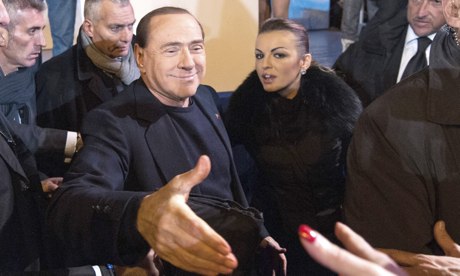
An Italian court has accused the former prime minister Silvio Berlusconiand his lawyers of tampering with evidence by paying off witnesses in a trial related to his notorious "bunga bunga" parties and has asked prosecutors to investigate the possible corruption of a judicial process.
The accusation in the court's ruling could lead to a new legal headache for Berlusconi, who this week was kicked out of parliament for at least six years because of another, unrelated problem: a tax fraud conviction.
The court suggested Berlusconi paid off the would-be showgirls who attended his dinner parties so they would play down the sexually charged nature of the evenings when they testified. He did so, the judges asserted, because he was facing related charges in another case involving accusations that he paid for sex with an underage prostitute who was also a "bunga bunga" guest.
Citing testimony and telephone wiretaps, the Milan court said Berlusconi convened about a dozen young women at his Milan mansion on 15 January 2011 to meet his lawyers after the women's homes were searched as part of a police investigation into the parties.
From then on, the judges wrote, the women each received €2,500 (£2,000) every month from Berlusconi and subsequently offered unusually identical testimony in court, denying the parties had sexual overtones.
The court made the accusation in explaining its decision to convict three of Berlusconi's former associates of procuring girls to prostitute themselves at the parties.
Berlusconi was not a defendant in the trial. He was convicted in a separate trial of paying for sex with a 17-year-old Moroccan girl, Karima el-Mahroug, better known as Ruby, who attended the parties, and then trying to cover it up. Berlusconi's lawyers have said they will appeal the verdict, seven-year prison term and a lifetime political ban.
Berlusconi has defended the payments to the girls, saying it is simply his nature to try to help people in need. Most of the women were aspiring showgirls hoping to get a break on one of Berlusconi's Mediaset television programmes. Many lived in apartments owned by Berlusconi, wore jewellery that were gifts from him and some drove cars that he gave them for their birthdays.
In its decision, the judges wrote that the girls gave "overlapping" testimony that contradicted testimony given by other participants in the parties who described sexually charged evenings where girls ended up in their underwear or dressed like nuns, dancing for Berlusconi and letting him touch them.
"All the people who received this amount of money gave declarations at trial that were perfectly overlapping, even in the use of language that was incongruent with their cultural background," the judges wrote. "In particular, there was a repetition of names, terms and phrases that the witnesses, when asked, said they did not know the meaning of the word or phrase that they had used.
"These were declarations that were directed in favour of Berlusconi."
The judges said it was not merely an anomaly that Berlusconi was paying monthly stipends to witnesses testifying in a trial in which he was indirectly implicated. "It's an illegal act: tampering with evidence."
In saying they had forwarded all the trial documentation to prosecutors, the judges accused Berlusconi of making the payments, and two of his lawyers of participating in the meeting on 15 January 2011. The judges accused the women of giving false testimony.